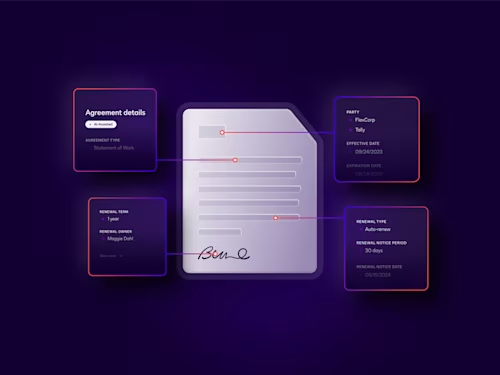
How Financial Services & Insurance Companies are Using Remote Online Notarization
Three common use cases for remote online notarization in financial services and insurance, including auto title transfers, beneficiary changes and more.

Over a billion documents are notarized each year, ranging from powers of attorney and affidavits to trust certificates and deeds. Traditionally, most notarizations have been done in person and on paper. But in recent years that has begun to change.
Now, the maturation of e-signature and audio-visual technologies has heralded the arrival of remote online notarization (RON), which makes it easier and more efficient for financial institutions, insurance companies and other organizations to obtain notarized signatures and provide their customers and members with a better digital experience. The demand for RON is increasing as more businesses have transitioned to remote working environments, and state legislation is catching up too, with more than 35 states passing some form of RON provision as of 2021. Much as we saw with e-signature over the past two decades, legal standards surrounding notarization will continue to evolve in ways that facilitate broader adoption of RON.
Electronic notarization alternatives have arrived
A notarization refers to the act of signing a document in the presence of a state-licensed notary public. Notaries public verify the signer’s identity, witness the document being signed, affix a notarial seal to the document and record the transaction in a journal.
Although notarization has held an important role in ensuring the validity of official transactions for thousands of years, until recently the process has not evolved to meet the changing needs of our digital lives. For financial institutions and insurers, the demands of an in-person notary experience translate to a manual, inefficient process that slows down the pace of doing business and ultimately drives up the costs for the organization. For members and customers, it can also be a frustrating and inconvenient experience.
To address these challenges, various electronic notarization services have evolved in recent years, including remote ink-signed notarization (RIN), in-person electronic notarization (IPEN), and remote online notarization (RON).
Of these, RON is the most transformative, as the entire process from beginning to end occurs in the digital realm, without the need for any exchange of paper or direct physical interaction between notary public and signer.
RON offers multiple benefits, including greater convenience and increased access to notarial services for signers, a more robust evidentiary record, reduced risk of fraud, and greater security and enforceability. It also creates a digital audit trail, which helps the notary public and organization track notarial activity over time to ensure compliance with local laws and regulations.
Three common RON use cases in financial services and insurance
Financial services and insurance organizations can start modernizing key business processes in the US today using remote online notarization. Some of the highest impact areas include:
Auto title transfers: Virtually every vehicle title transfer in the US requires a limited power of attorney, which must be notarized to complete a transaction. In the auto lending and insurance space, title transfers from borrowers to lenders or insurers are commonplace -- allowing the institution to complete important paperwork on the borrower’s behalf. For example, in the event of a total loss claim, a power of attorney is needed to authorize the insurer to legally transfer the title and potentially sell the vehicle to a salvage yard to compensate the policyholder. RON solutions can enable insurers to resolve claims faster for their customers and empower lenders to deliver a better refinancing experience to their borrowers.
Beneficiary changes & retirement distributions: When a retirement plan participant wishes to change beneficiaries or retirement benefit elections, certain ERISA-qualified retirement plans require spousal consent to authorize such changes. Spousal consent is often captured as part of a beneficiary designation form or a stand-alone form, and the spouse’s signature must be witnessed by a notary public. Wealth managers or insurance companies offering retirement solutions can help their clients more efficiently navigate plan changes using RON solutions.
Establishing trusts: Estate planning is a complex and important service provided by financial advisors to their clients. Trusts -- a fiduciary arrangement allowing a third party, or trustee, to hold assets on behalf of a beneficiary -- are a common component of estate plans. Trust agreements are often written specifically for a client and are often accompanied by a certificate of trust, a legal document that certifies the trust’s existence and the trustee’s legal authority to act. These documents often must be notarized, and the certificate of trust is also often requested by banking institutions to fund and open a trust account. Using RON solutions for these trust documents can simplify a planning process that wealth management clients often view as overly long and complicated.
In addition to internal business processes, many banks, credit unions and insurance agencies offer notarization as a discrete service and are willing to notarize agreements their customers or members bring into the branch, either for free or for a nominal fee. As remote and digital banking grow in acceptance, we expect more institutions to consider offering RON as a convenient and secure alternative to in-person notarization for these clients.
Introducing Docusign Notary
With Docusign Notary, banks, wealth management firms, and insurance organizations can now remotely and electronically notarize their critical agreements. Notary gives your notaries public the digital tools they need to securely conduct remote online notarizations via an encrypted audio-visual session. This helps you create a more seamless, convenient experience for your signers, mitigate risk with a robust audit trail and accelerate the speed in which you conduct business, all by taking your notarizations digital.
All of this is built on Docusign eSignature, making it easy for our customers to now send, sign and notarize agreements all within Docusign. Let’s see how Notary can notarize a power of attorney, as mentioned above.
Learn more about Docusign Notary and view our on-demand webinar on how financial services and insurance organizations can use Notary today.

Manas Baba is a product marketing manager for the financial services industry at Docusign.
Related posts
Docusign IAM is the agreement platform your business needs


